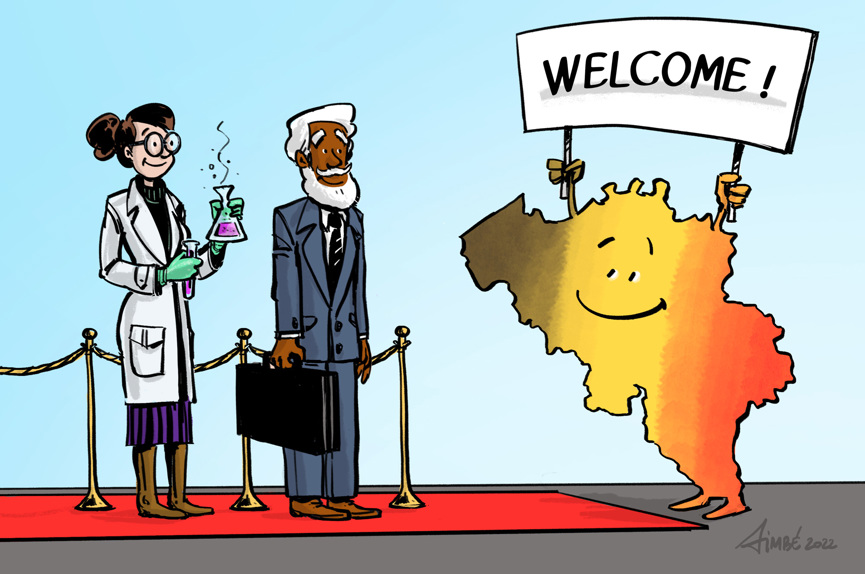- Employment Law
- foreign workers , secondment , special tax status , inpatriate taxpayer , inpatriate researcher , directly hired abroad , made available by , expatriate , Special Tax Regime , employment in Belgium
As of 1 January 2022, there is a new legal framework for foreign employees, managers and researchers who temporarily come to work in Belgium through secondment or direct recruitment. Before this date only an administrative circular letter from the tax authorities was the basis for the application of this special treatment. There was no legal framework.

The law of 27 December 2021 (called "Program Law") finally laid down the legal principles for the tax status of those employees, company directors and researchers who can enjoy a special tax regime.
The law introduces two new tax (favourable) regimes, namely a "Special Tax Regime for Incoming Taxpayers" (employees and company directors) and a "Special Tax Regime for Incoming Researchers".
1. Who is eligible for the special (tax) regime?
The following categories of (foreign) workers can call on this regime:
1.1 Inpatriate taxpayers
These are:
- Employees (or managers) who are directly hired abroad by
- a Belgian company, or
- a Belgian branch of a foreign company, or
- a NPO (VZW/ASBL or IVZW/AISBL);
- Employees (or managers) who are made available by a foreign company that is part of a multinational group to
- one or more Belgian companies, or
- one or more Belgian branches of a foreign company that belong to the same multinational group, or
- a NPO.
1.2 Inpatriate researchers
These are:
- Researchers who are directly hired abroad by
- a Belgian company, or
- a Belgian branch of a foreign company, or
- a NPO;
- Researchers who are made available by a foreign company that is part of a multinational group to
- one or more Belgian companies, or
- one or more Belgian branches of a foreign company that belong to the same multinational group, or
- a NPO.
The system for inpatriate researchers applies only to employees and not to company directors, unlike the system for inpatriate taxpayers.
1.3 Cumulative conditions that must be met
The following conditions must be fulfilled cumulatively for this group of employees or company directors:
- not to have been resident in Belgium or to have resided at a distance of less than 150 kilometres from the Belgian border, during the 60 months preceding the month of their entry into service;
- not to have been subject to non-resident tax on professional income in Belgium.
Having a foreign nationality is no longer a condition. Employees with Belgian nationality who fulfil the previous conditions are also eligible.
In addition, inpatriate taxpayers must receive a gross annual remuneration of more than EUR 75,000 for services performed in Belgium.
This minimum annual gross remuneration does not apply to incoming researchers.
The researcher must however (alone or in a group) exclusively or predominantly (at least for 80% of the working time) carry out scientific, fundamental, industrial or technical research activities within a laboratory or an enterprise that conducts one or more research and development programs. In addition, they must hold a specific degree (Master or Doctor in science) or have at least 10 years' relevant professional experience.
Both systems require that the employment in Belgium is temporary. The duration of the special status is maximum 5 years and can be extended once by 3 years.
2. Why is this special (tax) status so attractive?
The main tax advantages of the special regime the following:
- The employee can receive a reimbursement of up to 30% of his/her annual gross salary in the form of a lump sum of recurring expenses proper to the employer (but for a maximum of EUR 90,000 per year).
When assessing the minimum annual remuneration of EUR 75,000, this part of the total gross remuneration is not taken into account. In addition, the employer may also grant traditional expenses that are specific to the employer, such as the home-work allowance, the Internet allowance and so on. - Expenses that are borne by the employer, either directly or in the form of specific reimbursements, are also considered to be the employer's own expenses (i.e. expenses for which the employer can also intervene) insofar as these expenses concern
- (i) the costs of the employee's move to Belgium;
- (ii) the costs during the first six months related to the fitting out of the home in Belgium and;
- (iii) the costs of school fees for the children of the employee or his partner when they are of compulsory school age.
- The employee can also opt for the special double taxation regime in the framework of this status.
This new regime is incorporated in the 1992 Income Tax Code and applies both to personal income tax (with all the tax obligations that this entails) and to non-resident income tax (for inpatriate taxpayers and inpatriate researchers who maintain their tax residence abroad).
3. The Social Security’s viewpoint
The Social Security has communicated its point of view on the tax-free reimbursement of expenses under the new special tax regime.
It accepts that real and fixed expenses that are reimbursed under the special status are exempt from social security contributions and therefore do not have to be included in the DmfA declaration.
From the first quarter of employment this must be reported with a specific code in the DmfA return.
4. Abolition of the old tax system and transitional provisions
The old tax regime for expatriates is abolished and a transitional regime has been introduced for inpatriate employees and managers and researchers who were already working in Belgium before 1 January 2022 and who were already benefiting from the old tax regime.
For these expatriates the old regime remains valid until 31 December 2023.
But, inpatriate taxpayers and researchers who joined the "old regime" before 1 January 2022 can still benefit from it under the following conditions.
4.1 Old regime
Under the following conditions, one can still exceptionally apply for the old scheme in 2022:
- having already joined the old scheme (before 1 January 2022);
- within 6 months from the first day of the month following the employment or the secondment in Belgium;
- this period of 6 months has not yet expired on 31 December 2021; this period of 6 months cannot be extended.
The old regime can still be applied until 31 December 2023.
4.2 Option for the new tax regime
Certain inpatriate taxpayers and researchers will be able to opt for the new regime if they have been resident in Belgium for not more than 5 years on 1 January 2022 and if they meet the conditions of the new regime.
Employers who opt for the new regime must also submit their application by 31 July 2022.
5. How to submit an application?
The employer must submit an electronic application to the FOD/SPF Finance within 3 months after the employee or researcher entered the service of the employer in Belgium.
For the employees or researchers who choose not to establish their tax residence in Belgium, a certificate proving that the employee or researcher is subject to income tax as a fiscal resident of another State, must be attached to the application.
The tax administration then has 3 months to take its decision and to notify the employer and the employee (or researcher).
In the event of a change of employer or company, a new application for the special tax regime must be submitted by the new employer or company.
Should you need more information about this matter, please contact our specialists on +32 (0)2 747 40 07 or via info@seeds.law.



